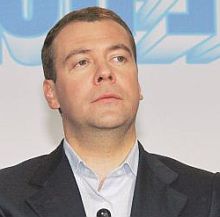 As the Soviet achievements keeping the Russian economy afloat are waning, President Dmitry Medvedev, on Thursday, sought an urgent modernisation of the country, insisting that it should happen "through democratic values and institutions".
As the Soviet achievements keeping the Russian economy afloat are waning, President Dmitry Medvedev, on Thursday, sought an urgent modernisation of the country, insisting that it should happen "through democratic values and institutions".
"The prestige of the nation and national welfare cannot be defined indefinitely by the achievements of the past. After all the oil and gas production complexes ensuring the lion's share of budget revenues, nuclear weapons, missiles and space achievements and infrastructure were mostly created by the Soviet specialists," Medvedev said in his annual address to the nation.
"I mean to say that all this has not been created by us, although it has been keeping our country afloat up to now, but it is rapidly waning, getting morally and physically obsolete," Medvedev said, calling for immediate start of the deep modernisation of all the aspects of the corruption-ridden society.
"In the 21st century the country again needs an all-embracing modernisation and this will be our first experience in modernisation based on democratic values and institutions," Medvedev said. "Instead of an archaic society, where leaders think and decide for everyone, we will become a society of clever, free and responsible people," he said, delivering his annual state-of-the-nation address before the members of the parliament and government officials.
"We must start modernising and technologically upgrading the entire production sphere. This is an issue of our country's survival in today's world," Medvedev said in his 100 minutes address in the ornate St. George's Hall of the Grand Kremlin Palace. He noted that in the Soviet era at the cost of immense efforts the illiterate and backward Russia was turned into a more or less modern industrialised power, but due to its totalitarian nature it failed in competition posed by the post-industrialised world.
As his predecessor Prime Minister Vladimir Putin flanked by the chairmen of the two chambers of the Russian parliament looked on from the first row, Medvedev went on: "We have to admit that in previous years we failed to do enough to solve problems inherited from the past. We have failed so far to dismiss the economy's primitive structure, the humiliating raw materials dependence and reorient production to people's real needs." Taking a dig at the Putin-era prosperity fuelled by booming oil prices, Medvedev said that while global prices grew, there were illusions that Russia could delay structural reforms.
Proposals were made to build up the growth of the old raw material-based economy while decisions on developing a new economy were isolated and few, he said. Medvedev identified the development of nuclear energy, space and telecom and pharma industries as some of the core sectors to give a fillip to the modernisation of the country. He told the government of Prime Minister Putin to simplify visa procedures for the foreign experts and scientists and create a Russian analogue of Silicon Valley to attract the best brains in the world for the innovative development of the country.
Russia will make massive arms acquisitions next year under the military reform aimed at 'lean but mean' armed forces, Medvedev said. "More than 30 land and sea-based (inter-continental) ballistic missiles, five Iskander tactical missile complexes, about 300 modern armoured pieces, 30 helicopters, 28 combat jets, 3 nuclear submarines, a 'Corvette' class warship and 11 spacecraft are to be supplied to the armed forces next year," Medvedev said. He also said that by 2012 all the military communications would be switched over to digital systems. Medvedev told the defence industry to 'drastically improve' the quality of military hardware produced by it and 'cut the costs'.
Medvedev also said Russia will closely work with other nations to strengthen the UN and multipolarity in the world, signalling that Moscow will continue to follow its policy against the global dominance ofthe US. Medvedev said the G-20 summit of the world's leading economies is an expression of multipolarity in the present day world and Moscow is ready to closely interact with other nations to strengthen it. "As before, we are for strengthening the multipolarity, which, I believe, is clearly taking shape in the world," Medvedev said, giving the example of G-20, where the nations are virtually involved in discussing their domestic problems.
He underscored the United Nations is the only universal mechanism for collective approaches to the key issues. "Lately, perhaps for the first time since the end of the Cold War, the UN is gathering momentum. We will actively contribute to the strengthening of the position of the organisation," the Russian leader said in his annual addressto the nation. Medvedev expressed Moscow's willingness to 'change approaches' and 'think more' on how to develop joint work with others.
"We are ready for this, including in resolving the complex issues of the global policy, such as nuclear programmes of Iran and North Korea, instability in Afghanistan, West Asia crisis and other problems," Medvedev said.
He said Russia will pursue 'exceptionally pragmatic' foreign policy, which should contribute to the improvement in the living standards of the people. "Our relations with other nations should also be aimed at the accomplishing the tasks of Russia's modernisation, we need not put our nose in the air," Medvedev said and ordered the government to set the criteria for judging the effectiveness of diplomacy. "The diplomatic activities in the interests of the country should be under special control. Its results should be reflected not only in backing the Russian companies abroad, but also on the volume of attracted foreign investments and inflow of latest technologies into the country," he stressed.
Image: Russian President Dimitry Medvedev






 © 2025
© 2025